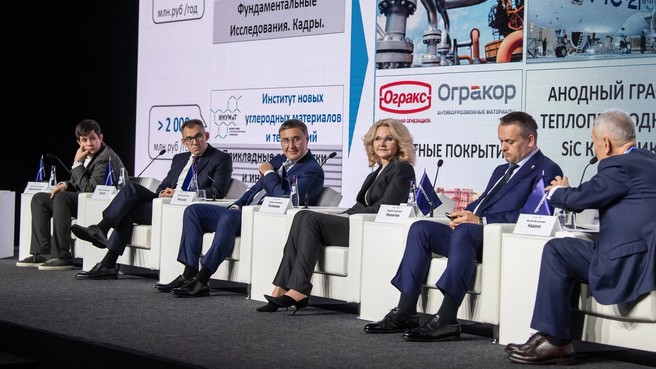
Tatyana Golikova spoke at the open discussion “Priority 2030: from a university idea to technological leadership”
Deputy Prime Minister Tatyana Golikova spoke at the open discussion “Priority 2030: from a university idea to technological leadership.” The discussion took place as part of the “Priority – Technological Leadership” conference. The event was also attended by the Minister of Science and Higher Education Valery Falkov, the Minister of Transport Andrei Nikitin, the Deputy Chairman of the Board of Gazprombank Dmitry Sauers, the General Director of the Institute of New Carbon Materials and Technologies Viktor Avdeev and the Director of Innovation of EFKO Management Company JSC Rostislav Kovalevsky.
The Priority program has been implemented since 2021 and is the largest state support program for universities in the history of Russia. It covers 56 regions of the country and 141 universities. Universities from 15 federal ministries and departments participate in the program.
In second place in terms of the number of participants are universities of the Ministry of Health of the Russian Federation. And in terms of the number of technological projects announced for implementation, the leader is the “Medicine and Biotechnology” direction – 22% of the total.
Medical universities participating in the program occupy leading positions, implement technological projects and already have product results.
Tatyana Golikova recalled that a national project “New Health Saving Technologies” has been launched in Russia, which assumes that by 2030 Russian healthcare should be 80% technologically independent.
“It is important for us that the universities, which are supported by Priority 2030 and are included in the national project of technological leadership, are not only forges of personnel. They are also science and high technology. The synthesis between these areas is extremely important,” she noted.
According to the Deputy Prime Minister, the Russian pharmaceutical market at the end of 2024 exceeded 1.1 trillion rubles. The share of Russian medicines in total sales is 67%, and in government procurement – 85%.
“It is very important for us that innovative drugs appear, that our own medical products appear. Our leading participants in Priority 2030, including Sechenov University, Pirogov University, Samara State Medical University, Siberian Medical State University, all of them are platforms that have already proven themselves,” emphasized the Deputy Chairman of the Government.
Head of the Ministry of Education and Science Valery Falkov drew attention to the fact that starting this year, the Priority program has been reoriented to fulfill the national goal set by the President of Russia to achieve the country’s technological leadership. This required a complete reassembly of university development programs.
As a result, more than 280 strategic technology projects are planned in 9 areas of priority technology leadership. A strategic partner of the program appeared in the person of Gazprombank, which assumed obligations to conduct technological examination of university projects.
“The University of Technological Leadership must be an active, full participant in economic relations,” noted Valery Falkov.
Transport Minister Andrei Nikitin spoke about how Priority universities are participating in the creation of end-to-end transport technologies.
“In 2021, when conversations about high-speed traffic were just beginning, an advanced engineering school was formed at the Russian University of Transport. She began studying the issues of high-speed traffic and unmanned technologies. This was an exact hit on target – today this direction is the main driver of industry development,” Andrey Nikitin emphasized. – The School of Engineering has become a platform that brings together business, science, applied technological developments and enterprising students who want to build their future in high-tech fields. We are actively discussing at the Ministry of Transport how we can expand the number of such schools and strengthen our participation in the Priority 2030 program. Understanding how important this is, we believe that this is the best tool for achieving technological leadership and developing industry innovation.”

